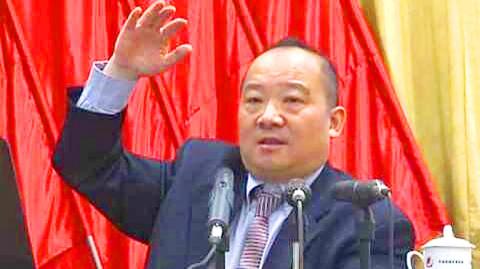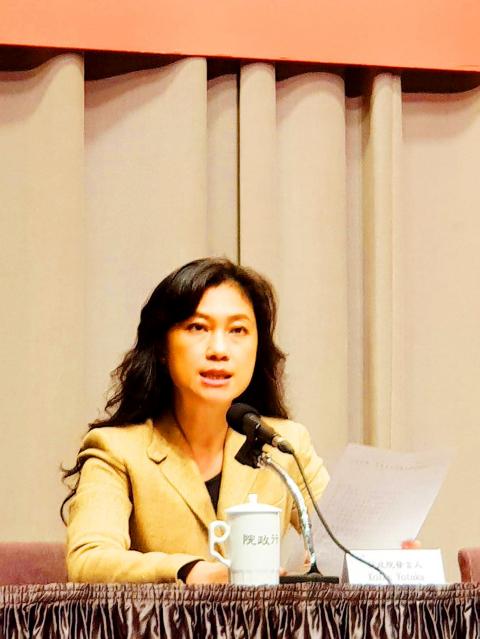The entry into the nation by pro-unification Chinese academic Li Yi (李毅) to attend a forum hosted by the Chinese Unity Promotion Party was illegal, the Mainland Affairs Council and the National Immigration Agency (NIA) said yesterday, revoking his visa and ordering his deportation.
As of press time last night, the NIA’s Taichung office was working to ascertain Li’s whereabouts.
Li was invited to speak on “maintaining the prospects of peaceful unification” at the forum, which is to follow a demonstration scheduled for tomorrow in Taichung, Executive Yuan spokeswoman Kolas Yotaka said.

Photo: Copy by Chang Jui-chen, Taipei Times
Premier Su Tseng-chang (蘇貞昌) had instructed both agencies to look into the matter, citing national security concerns, she said.
The NIA and the council decided to revoke Li’s visa, citing a breach of Article 16 of the Regulations Governing the Approval of People of the Mainland Area Visiting Taiwan for Purposes of Tourism (大陸地區人民來台從事觀光活動許可辦法), Kolas said.
Li applied to enter the nation for sightseeing as a US resident, the agencies said, adding that he posed a “potential threat to national security.”

Photo: Li Hsin-fang, Taipei Times
Regarding tomorrow’s planned demonstration, Kolas said that as the Taichung City Government had already approved it, it would fall under the city’s jurisdiction.
Author Joyce Yen (顏擇雅) said in a statement on Facebook that the party calling Li a “visiting sociology academic from the US” was an attempt at obfuscation.
While Li obtained his doctoral degree in the US, he does not hold a teaching position at any US university, Yen said.
Li is most often cited by the media as a researcher at Beijing’s Renmin University of China, she said.
Contrary to the stated topic for his talk at the forum, Li is a known supporter of unification through armed invasion, she added.
Yen called for a review of the nation’s legal system to determine how Li was allowed to “spread his views” in Taiwan, especially after he in 2016 said that China should send 25 million “new immigrants” to Taiwan to solve the “Taiwanese independence problem.”

INVESTIGATION: The case is the latest instance of a DPP figure being implicated in an espionage network accused of allegedly leaking information to Chinese intelligence Democratic Progressive Party (DPP) member Ho Jen-chieh (何仁傑) was detained and held incommunicado yesterday on suspicion of spying for China during his tenure as assistant to then-minister of foreign affairs Joseph Wu (吳釗燮). The Taipei District Prosecutors’ Office said Ho was implicated during its investigation into alleged spying activities by former Presidential Office consultant Wu Shang-yu (吳尚雨). Prosecutors said there is reason to believe Ho breached the National Security Act (國家安全法) by leaking classified Ministry of Foreign Affairs information to Chinese intelligence. Following interrogation, prosecutors petitioned the Taipei District Court to detain Ho, citing concerns over potential collusion or tampering of evidence. The

‘FORM OF PROTEST’: The German Institute Taipei said it was ‘shocked’ to see Nazi symbolism used in connection with political aims as it condemned the incident Sung Chien-liang (宋建樑), who led efforts to recall Democratic Progressive Party (DPP) Legislator Lee Kun-cheng (李坤城), was released on bail of NT$80,000 yesterday amid an outcry over a Nazi armband he wore to questioning the night before. Sung arrived at the New Taipei City District Prosecutors’ Office for questioning in a recall petition forgery case on Tuesday night wearing a red armband bearing a swastika, carrying a copy of Adolf Hitler’s Mein Kampf and giving a Nazi salute. Sung left the building at 1:15am without the armband and apparently covering the book with a coat. This is a serious international scandal and Chinese

Seventy percent of middle and elementary schools now conduct English classes entirely in English, the Ministry of Education said, as it encourages schools nationwide to adopt this practice Minister of Education (MOE) Cheng Ying-yao (鄭英耀) is scheduled to present a report on the government’s bilingual education policy to the Legislative Yuan’s Education and Culture Committee today. The report would outline strategies aimed at expanding access to education, reducing regional disparities and improving talent cultivation. Implementation of bilingual education policies has varied across local governments, occasionally drawing public criticism. For example, some schools have required teachers of non-English subjects to pass English proficiency

TRADE: The premier pledged safeguards on ‘Made in Taiwan’ labeling, anti-dumping measures and stricter export controls to strengthen its position in trade talks Products labeled “made in Taiwan” must be genuinely made in Taiwan, Premier Cho Jung-tai (卓榮泰) said yesterday, vowing to enforce strict safeguards against “origin laundering” and initiate anti-dumping investigations to prevent China dumping its products in Taiwan. Cho made the remarks in a discussion session with representatives from industries in Kaohsiung. In response to the US government’s recent announcement of “reciprocal” tariffs on its trading partners, President William Lai (賴清德) and Cho last week began a series of consultations with industry leaders nationwide to gather feedback and address concerns. Taiwanese and US officials held a videoconference on Friday evening to discuss the